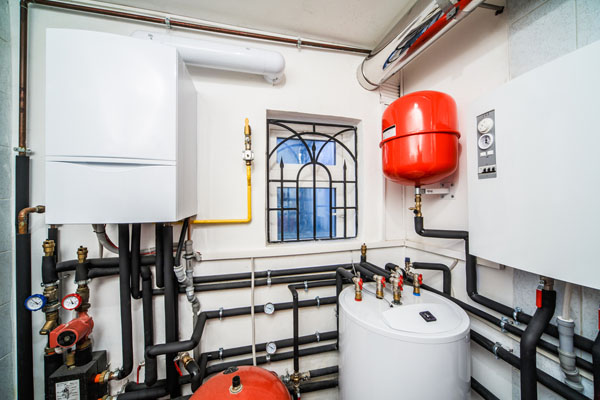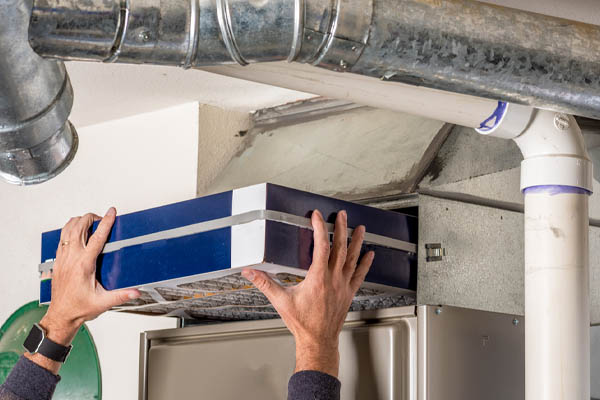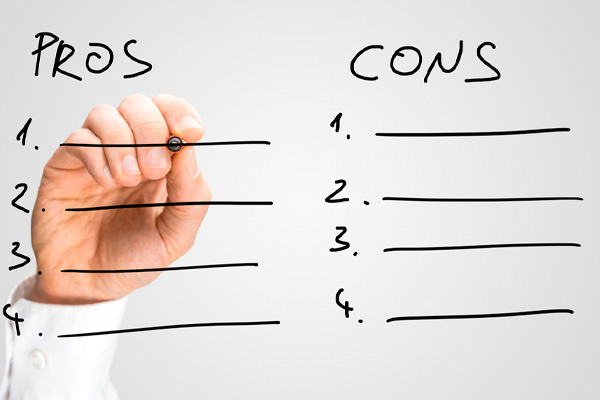Contents
There’s often confusion among some homeowners regarding boilers and furnaces. This is understandable, given that both systems provide heating for homes. However, this is where their similarity ends. Despite their shared goal of heating homes, a boiler vs. furnace will differ substantially. Choosing between the two depends on your heating needs and setup, so it is important to understand their disparities, advantages, and distinctions.
Differences Between A Boiler And Forced-Air Furnaces
This article delves into the several fundamental distinctions between boilers and furnaces.
Related Article: What Is Mechanical Ventilation & How Does It Impact Your Home Comfort?
What Is A Boiler?

A boiler is a sizeable, enclosed container designed to heat water or liquid to produce steam and vapor. It is a central element in most heating systems, contributing to heat emission and distribution.
The use of water or liquid for heating purposes is called hydronic heating or radiator system. Besides the boiler, the system has additional components, including baseboards, radiators, a network of pipes, and a circulator pump. These components are strategically placed across various rooms and spaces to facilitate the even dispersion of heat. Depending on a home’s room count, a residential boiler system could comprise a modest or extensive assembly of elements.
Related Article: Top HVAC Installation Mistakes to Avoid
What Is A Furnace?

A furnace uses air to generate heat, which is circulated to various rooms in the home. This type of heating system is commonly called a “forced-air heating system.”It propels cool or ambient air through a heat exchanger, where the air is warmed. The heated air then travels through an HVAC ductwork network to be evenly dispersed throughout the house. Furnaces come in three variations: horizontal, upflow, and downflow. They can be powered by oil, electricity, gas, or induction.
Related Article: 7 Reasons Your Filter Isn’t Improving Your Indoor Air Quality
Differences Between A Boiler Vs. Furnace
The primary distinction between a boiler and a furnace is their operational method. A boiler functions by heating water within a container or tank to generate heat. The heated water is then propelled through a network of pipes that traverse the house or building. The pipes, warmed by the hot water, emit heat, warming the rooms. A boiler heating system can maintain a comfortable temperature as long as it continues producing hot water or steam.
In contrast, a furnace heating system employs a heat exchanger. This process heats air, not any fluid or water, which is subsequently circulated throughout the home for warmth. The circulation is facilitated by a blower motor that propels the air through vents and ductwork.
Energy-Efficiency: Boiler Vs. Furnace
Heating air consumes more energy than heating water. This is why furnaces use more fuel over a shorter timeframe than boilers. Concerning expenses, boilers often come with a higher initial cost but are more durable than furnaces. How well the unit is maintained is also a huge factor.
Related Article: Why Is HVAC Airflow So Important For My Home?
Boiler: Pros And Cons

Pros
- Efficiency: Boilers typically require less fuel to generate heat, resulting in lower energy costs.
- Reduced Noise: Boilers operate without the need to circulate hot air extensively, leading to quieter operation than furnaces.
- Consistent Heat: Heating with hot water or steam offers more uniform warmth than hot air systems.
- Better Air Quality: Boilers do not circulate air like furnaces do. This means they do not distribute dust, pollen, and other particles.
Cons
- Heat Exclusive: Boilers solely provide heating and do not possess cooling capabilities. In contrast, furnaces cannot cool, but their ductwork can accommodate central cooling systems.
- Complex Installation: Boiler installation demands more time and effort.
- Slower Heat Adjustment: Boilers require a longer transition period to adapt to thermostat temperature changes.
- Risk of Leaks: Old or damaged boilers pose a heightened risk of water or fluid leakage, potentially leading to future water damage.
- Difficult Conversion: Converting a boiler to a furnace is challenging and comes with considerable costs, mainly due to the required ductwork installation.
Related Article: How Does An Oil Heating System Work?
Furnace: Pros And Cons

Pros
- Versatility: Furnaces can be powered by electricity, natural gas, heating oil, and propane. While there are models powered by solar or geothermal energy, these tend to be less common.
- Quick Response: Furnaces can produce more heat rapidly than boilers, allowing homes to warm up in a shorter timeframe.
- Cost-Effective: Due to their widespread availability, a wide array of furnace units and models are on the market. This makes furnaces more competitive in terms of pricing. Residential boiler prices, on the other hand, are more costly.
- Minimal Leakage: Should a furnace suffer a leak, it would involve air leakage instead of water or fluid, resulting in reduced potential for damage to the home.
- Zero Freezing Hazard: In areas with extremely low winter temperatures, homes relying on furnaces for heating are less susceptible to the risk of frozen pipes and potential bursting. This risk exists with boiler systems since they use water for heating.
Cons
- Noise: Furnace blowers generate noise as they circulate air for distribution. Each time a furnace is activated, it will make a noise.
- Inconsistent Heat: The heated air produced by a furnace is not as consistent as the ones generated by a hot water or steam boiler. This can result in varied temperatures, causing certain rooms to feel warmer or cooler than others.
- Air Quality: Neglecting regular maintenance or replacement of air filters can lead to a decline in indoor air quality.
Related Article: When To Repair Vs. Replace Your Heating System
Conclusion
The choice between getting a boiler and a furnace depends on your heating (and cooling) requirements and the existing infrastructure of your home. If you are upgrading from an older heating system to a new one, remember that modern boiler and furnace brands come with high-efficiency ratings, leading to long-term cost savings. If you are still unsure which system to choose, ask your local HVAC contractor for expert guidance.
Tevis Energy’s sister company, Modern Comfort, performs HVAC installations, replacements, tune-ups, and more. Our technicians can provide you with expert HVAC services to ensure that your system provides you with the comfort and efficiency you deserve. Call now to schedule an appointment.
Related Article: Why Are My Rooms Heating Unevenly?
Call Tevis Energy For All Your HVAC Requirements

For high-quality heating and cooling services in central Maryland and southern Pennsylvania, call Tevis Energy. Our team of highly skilled and professionally certified technicians specializes in excellent HVAC replacements, installations, repairs, tune-ups, and more. Count on all our knowledgeable and experienced techs to service your HVAC system correctly.
Our company offers highly competitive heating and cooling service costs. Our maintenance services can assist in improving indoor air quality, comfort, and energy efficiency in your home while reducing your heating and cooling bills. We can help you find the best solutions within your budget if you need an HVAC repair or replacement system. All our work is backed by a guarantee to ensure your satisfaction. Give Tevis Energy a call to schedule a service appointment. We offer free, in-home estimates. Call now!
You can click here to contact us now or call us at (410) 876-6800 to find out more! Click the link to view our service area.
Posted in Blog
Tags: